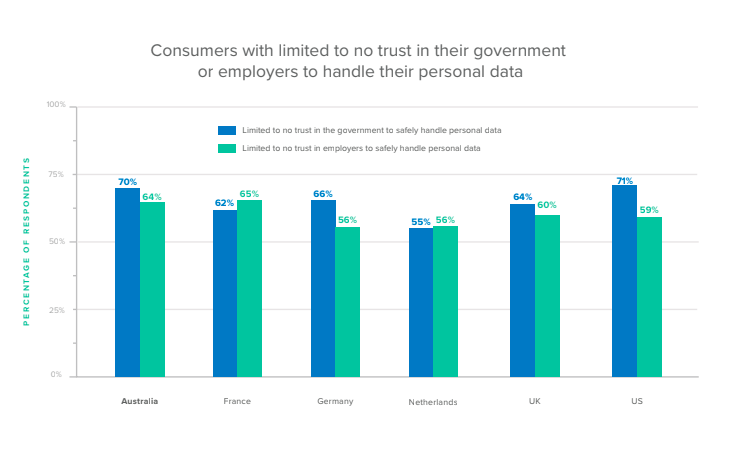An international survey has found Australians are highly distrustful of government surveillance and data collection, especially in relation to COVID-19.
Cloud software vendor Okta commissioned an online survey of over 12,000 people between the ages of 18 and 75 in Australia, France, Germany, the Netherlands, the UK, and the US.
It found seventy per cent of Australians were uncomfortable with the government handling their data, and it also found Aussies are “shockingly unaware” of how much their data is collected.
“From Cambridge Analytica to the news that Australia’s My Health Record has suffered two potential data breaches, a never-ending list of controversies have shed a light on consumers’ shrinking levels of privacy,” the report, The Cost of Privacy, says.
“Yet our data shows that many consumers are not aware of the routine tracking and data harvesting that takes place daily.”
But it also found that Australia isn’t alone and distrust in government is high around the world, although social media companies ranked lowest in the trust stakes.
Trust in the age of coronavirus
When it came to the Coronavirus pandemic, a third of Australians said they felt less comfortable with the idea of data tracking if the government was involved.
However concern was higher among Americans, with 45 per cent of US respondents expressing similar concerns.
Almost 80 per cent of Australians believe personal data collected for COVID-19 will be used for more than the stated public health purpose, with 63 per cent worried it will be accessed for law enforcement purposes.
“Australians show widespread discomfort with the idea of their data being collected to aid the containment of COVID-19,” the report says.
Aussies were slightly more comfortable with medical data being collected for this purpose.

“While the public health benefits of collecting data to track the spread of COVID-19 are clear, consumers in every country surveyed are worried about privacy,” the report concludes.
Across Australia, the UK, the US and Germany respondents report significantly higher trust in their workplace to handle their personal data than the government.
General Manager APAC at Okta Graham Sowden says the report shows Australians’ understanding of identity and privacy is lagging behind the rate of digital transformation.
“There’s an interesting dichotomy as people struggle with the trade-off between accessing and benefiting from digital services, whilst trying to protect their privacy
“Few people understand the scope of their online identity and the extent to which government agencies and companies collect their data. In order to strike a balance between privacy and innovation – so users feel in control of their online identity – they will need to demonstrate that they’ve taken the precautions to secure and protect the data they collect.”
Twenty per cent of Australians think the government collects data about offline conversations and 28 per cent think the government collects biotmetric data about them, the report found
Aussies willing to trade off privacy for better service
Meanwhile, a separate and somewhat contradictory survey by professional services provider Accenture found 72 per cent of Australians were willing to share personal information with government agencies in exchange for better and more personalised customer experience.
Accenture, which also provides AI services and is a strong proponent of the technology, also found most Australian like the idea of chatbots, or virtual service assistants.
“Our research found that citizens support the use of advanced AI-enabled virtual agents by government agencies. With COVID-19, we have seen exponential growth in adoption of digital services across all Industries including government,” John Vidas, Client Group Lead – Health & Public Service, Accenture Australia & New Zealand said.
“Clearly, an opportunity exists for governments to use virtual agents to broaden their services and enhance customer experience,”
The survey found three quarters of those surveyed saw benefits in using AI enabled customer service chatbots and 46 per cent said they’d be comfortable with personal information being shared between government agencies if it meant better customer service.
Forty-four per cent said they would like to complete some transactions using virtual agencies and 48 per cent said they believed their query could be resolved in the shortest time possible using as chatbot. More than half believed there would be benefits from having around the clock access to government services.
Accenture questioned 500 Australians as part of a survey of 6,500 respondents across 11 countries.





Leave a Reply